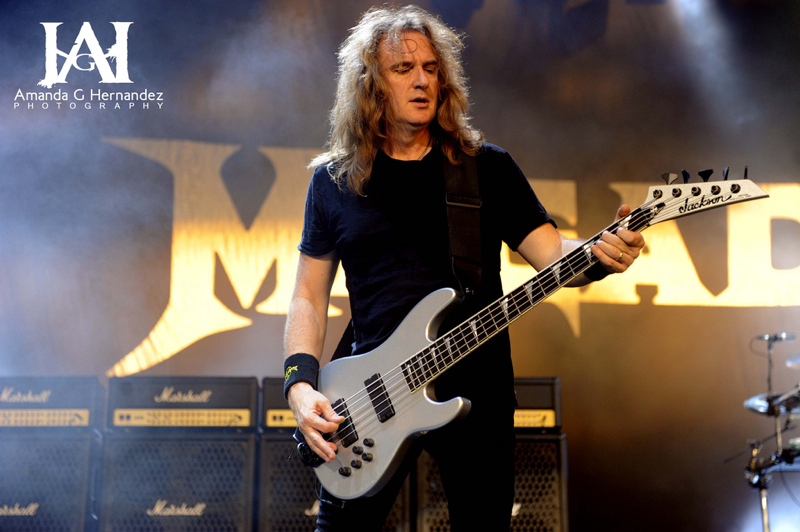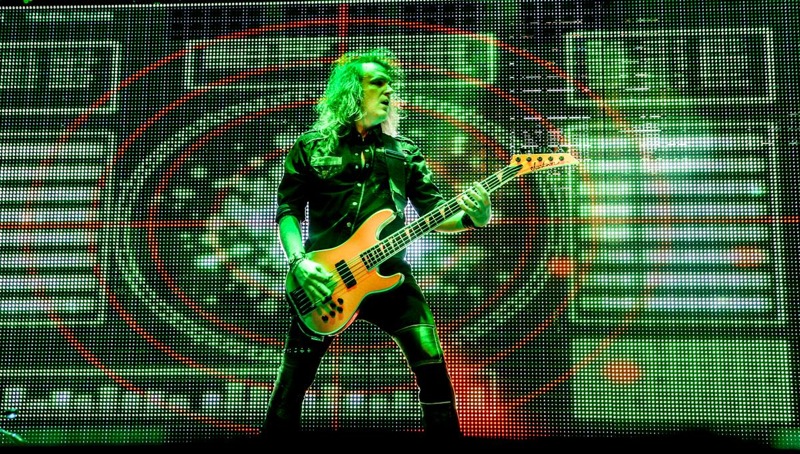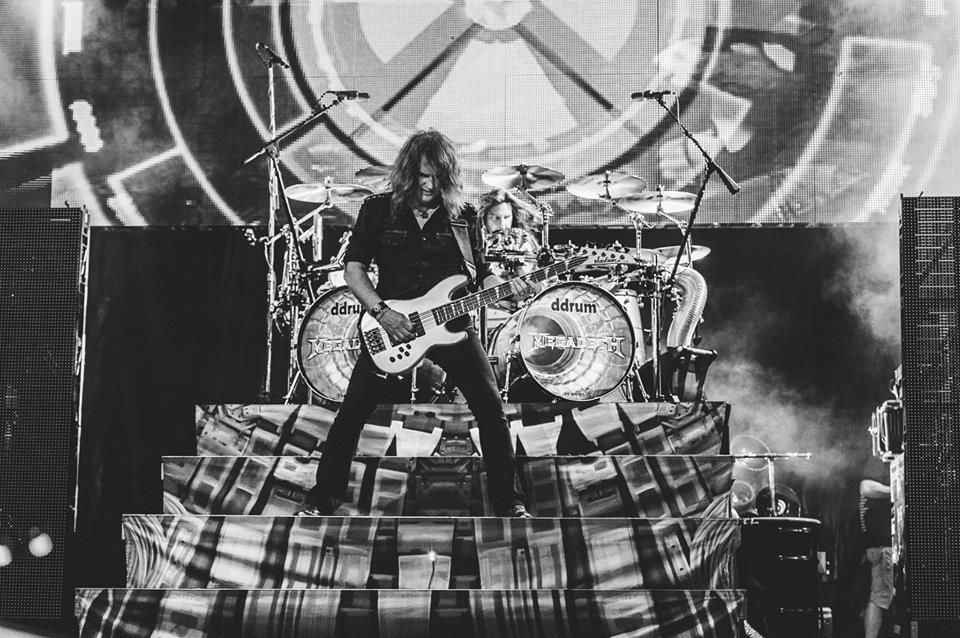By Andrew Bansal
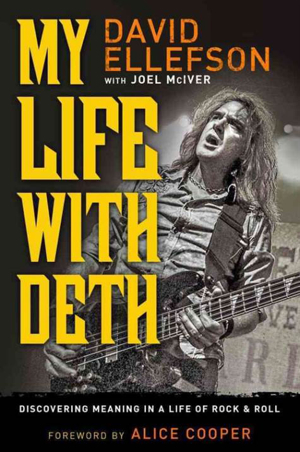 Throughout my journey as a journalist in hard rock and heavy metal over the past few years, I’ve constantly maintained that Megadeth bassist David Ellefson is one of the most professional, articulate and down-to-earth guys ever to have graced our favorite genre of music. His return to Megadeth in 2010 couldn’t have come at a better time, and he has had a huge role in taking the band to the next level, specially as a live act. And now, he’s ready to release his autobiography titled ‘My Life With Deth’, which is hitting book stores on October 29th via publishing company Simon And Schuster. I couldn’t imagine anyone in metal more ready to talk about his own life, and upon reading this book, I found it to meet all the expectations I had from it. A couple of days ago, even as he’s currently on a Megadeth tour with Black Sabbath in South America, he took 15 minutes out of his schedule to talk to me about this book. Enjoy the conversation below, and if you’re into rock n’ roll books at all, this is certainly one you should purchase.
Throughout my journey as a journalist in hard rock and heavy metal over the past few years, I’ve constantly maintained that Megadeth bassist David Ellefson is one of the most professional, articulate and down-to-earth guys ever to have graced our favorite genre of music. His return to Megadeth in 2010 couldn’t have come at a better time, and he has had a huge role in taking the band to the next level, specially as a live act. And now, he’s ready to release his autobiography titled ‘My Life With Deth’, which is hitting book stores on October 29th via publishing company Simon And Schuster. I couldn’t imagine anyone in metal more ready to talk about his own life, and upon reading this book, I found it to meet all the expectations I had from it. A couple of days ago, even as he’s currently on a Megadeth tour with Black Sabbath in South America, he took 15 minutes out of his schedule to talk to me about this book. Enjoy the conversation below, and if you’re into rock n’ roll books at all, this is certainly one you should purchase.
Dave, it’s good to have you again on Metal Assault. Right now I believe you’re in South America, touring with Black Sabbath. And last month you toured with Iron Maiden. So you’ve been having quite a good time of it lately, isn’t it?
Yeah, it’s great! This is really a fun season, to put out the new record ‘Super Collider’, to do Gigantour in North America, and then to tour with Maiden, which we haven’t done in the United States for 25 years! We’re quite a different band than we were 25 years ago. At least we’ve earned our keep now, you know. 25 years ago we were the new band on Capitol Records and Iron Maiden were the big eight hundred-pound gorilla (laughs), so it’s kind of cool to play with each other all these years later. We’ve done a lot of shows with Maiden over the years in Europe but to be able to do that back here in America was great. And then of course South America is one of our biggest territories in the whole world on our own, and to be down here in the stadiums playing the biggest shows with Black Sabbath, it’s really cool because our bands are stylistically different but the fans down here just love metal. So it’s one of these places where bands like Sabbath and Megadeth work really well together.
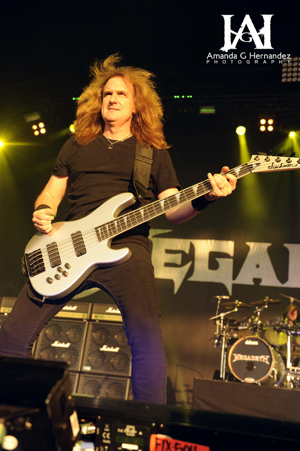 Absolutely. Moving on, in this interview I’m mainly going to talk to you about your autobiography ‘My Life With Deth’ which is officially releasing on October 29th. I’ve had for a while actually and I’ve read it. It’s really cool to have your perspective on things, but first of all, how long have you been wanting to write a book like this?
Absolutely. Moving on, in this interview I’m mainly going to talk to you about your autobiography ‘My Life With Deth’ which is officially releasing on October 29th. I’ve had for a while actually and I’ve read it. It’s really cool to have your perspective on things, but first of all, how long have you been wanting to write a book like this?
You know what, to be honest with you I didn’t really have an aspiration to write a book, at least autobiographical. I mean, I thought about it, of course. Probably the biggest thing with this is, when is the right time to do it? My co-author Joel McIver really urged me in 2010 when I came back into Megadeth and all these big things were going on with the Big Four, the Rust In Peace 20th anniversary and it was just such a huge moment for Megadeth and also for thrash metal, that he was like, ‘Man, now is the time!’ So, I followed his lead with it and I’m glad he encouraged me to do it because Joel is an accomplished author and he’s done these kinds of books before, so to have him lead the way for me with the process was great. The story was easy, because it’s my story and it was just about putting that down on paper more than anything. But to have the process of writing the book, editing it, finally releasing it and all that stuff, it was cool to do that with Joel because it’s nice to have a partner, someone who’s down that route before.
Even though it’s your story and like you said, it’s easy to put down on paper, it must have still been a bit of a challenge to think back about so many years of your past life.
Yeah, like Joel told me, writing a book can be a very emotional experience. It can be very cleansing. It can be at times somewhat painful. But I’ve done a lot of other things in my life where I’ve gone through some personal house-cleaning, inventory and looking at things in my life and getting me really in touch with my part in things. So because I’ve gone through a lot of that process on my own over the years, writing the book wasn’t so difficult on that level. It wasn’t like I needed to tell this story as some sort of a personal cleansing or anything (laughs), which I’m glad about because it’s a pure story and it’s not one that sort of has any anger or retribution in it. It’s not one of those things where I got to tell my side of the street. It’s not a book like that, and so many of them tend to be. So I’m glad that mine is a pretty clear perspective of not only my life in Megadeth, but ultimately when I was looking back at the final edits of it, what I was probably most happy about was, this is the story about a guy who fell in love with rock n’ roll and fell in love with playing the bass, and those two things shaped and carved out the journey of my life.
Right, it’s not like a dirty rock n’ roll tell-all kind of a memoir. It’s more of an uplifting, serious book.
Yeah! I would agree with that, because it’s just not in my nature to go and do all that, to just throw everyone under the bus so that I can get my glory (laughs), because in order for someone to rise up, someone else has to be pushed down. And that’s not how I lived my life and it’s just not the kind of book I wanted to write. As I was talking about my family, about lifestyle issues, about faith, religion and all these things, the one thing I thought about was, at the beginning and end of the day I’m a rock n’ roll kid. So I was thinking about our fans and how they would enjoy reading the story. And it didn’t change the story, that’s the good news (laughs). The story very much developed as I wanted it to, because I kept that end in mind.
You also talked about the culture shock you experience in Los Angeles, as you are from such a different upbringing in Minnesota. Even after all these years, what do you feel? Are you used to Los Angeles now or are there still some aspects of LA that shock you?
There are parts of LA that make me uncomfortable. And by that I don’t mean a particular neighborhood or anything like that. To me, I go back to LA and it’s probably like how it is for a lot of kids that go back to their college alma mater (laughs), they look around the college campus and go, ‘Oh, I remember when I was 18 and I was here!’ That to me is how LA is like. It’s like going back and revisiting a whole period of my life when I was a young man, and a much different man than what I am today. I don’t hold anything against Los Angeles, but those were like my college years there and I learned a lot. It was essentially my college. I had to grow up quick, I had to learn skills of living in a city, skills of being on my own, skills of being in a new rock n’ roll band that we were forming called Megadeth, and there was a lot to learn real quick. I always do better with hands-on learning. So to just leave the farm in Minnesota, drive to Hollywood and just jump in the shark tank with a bunch of vicious sharks was I suppose the best way for me to do it (laughs).
That’s very well put. In the book you’ve also touched upon the religion aspect. As we know, heavy metal is such a rebellious thing in so many ways, and a lot of people don’t really like religion. So, were you having any second thoughts or fears about bringing up the subject in the book?
I was, for sure, absolutely. And again, I wanted to be sensitive first of all to our fans, to the readers, and I really just wanted to talk about my journey and my experiences. At one point I even said that none of us are perfect and all of this stuff. The best I can claim to be is a work in progress. So I’m certainly not an expert on faith or religion or any of those things. I’m a middle-aged guy who’s just had my life experiences with it, and that’s really all I’ve talked about.
Right, that’s true. So, I read Dave Mustaine’s book which came out around three years ago and now I’ve read your book. He talked about you in his book as well, so for the same chapters of the Megadeth history, do you think that the events match up in the two books?
I hope so! I kind of deferred to Joel McIver on that, because he had read Dave’s book and he’s an author himself, he would have looked at it with a different perspective than I would have. So I deferred to him, but it’s interesting that Dave and I are probably the only guys who’re actually in the same band and both wrote autobiographies (laughs), because most of these books tend to be the book you write when you’re not in the band anymore. So I’m glad that Dave and I were able to write books that told our life stories, told our history with Megadeth, but also were in a lot of ways complimentary. I’m very thankful for everything Dave and I have done together, and I think it’s real clear in my book that Dave has been a big brother to me. He’s been a musical partner but just as much he’s been a friend and a big brother. I really wanted to make that point known and clear to everybody in my book.
Talking of books, is there any rock n’ roll autobiographies or books in general that you have really enjoyed reading?
I liked reading Ace Frehley’s book. I thought it was cool, and I’m a big KISS fan. I also liked Sammy Hagar’s book, and I guess those were probably the two that stand out. I remember when Slash’s book came out, he was really one of the first ones to write an autobiography, at least of guys our age. A lot of musicians and actors sometimes write a memoir at the end of their careers, but for guys like us who are still in the business and still in very fruitful and active years of our career, to write these books is a new trend. I’ve read some of the KISS books over the years, and they were not written by members of KISS but were written by these third parties who were around the band. As a fan of the band, I enjoyed reading them. I do think on one level when these are official autobiographies that we musicians write about our lives, they have a different impact because they are our words and they are how we viewed that situation, standing in our shoes, but it’s also probably not the only version of it (laughs), because as the saying goes, there are three sides to every story, yours, mine and probably a third version that has some truth to it as well.
That’s very true. I have just one more question for you. You’ve done so much in metal and Megadeth, you recently also narrated a war-based documentary and now you’re releasing a book. Is there anything else you would like to do that you haven’t done yet?
You know what, I enjoy doing some other co-writing from time to time. I think with Megadeth we found over the years that it’s a very specific style of riffs and songs from the lyrics to the music that works well with Megadeth. But because we’re all songwriters we often write things that don’t work in Megadeth, and I’m enjoying finding some other partnerships where I can do something with those songs and that music. I can do those things in my down time, when Megadeth is not touring or recording. Those are good things, you know. Years ago, being in Megadeth only as a full-time member when I was younger, you get to that point where there are other sides of you that you want to create and express through the music you write. Sometimes it’s frustrating when you can’t find an outlet for that. I look at a lot of bands where members never branched out to go do anything else. They’ve only been in one band their whole life, and I don’t know how they do it (laughs), because I think all of us need to be fully expressive otherwise there’s a part of us that starts to die. That goes for even if you’re the main songwriter of the group. Sometimes there are songs you write that need to be expressed. That’s why it’s kind of cool when people get into writing film soundtracks, scores and different things like that. So that’s a season of my life that I’m exploring right now, and having some fun with it. It’s nice because when I’m playing with Megadeth, I can really be 100 per cent focussed on what we do and make sure that what we do is great, that it’s the best it can be and not somehow contaminate with something that’s not meant to be there.
Related – Gig Review: Megadeth Plays Intimate One-Off Los Angeles Show
Visit David Ellefson on the web at:
DavidEllefson.com
facebook.com/DavidEllefson
twitter.com/EllefsonDavid
instagram.com/DavidEllefsonBass
Pre-order ‘My Life With Deth’ at:
MyLifeWithDethbook.com
Visit Simon And Schuster on the web at:
simonandschuster.com
